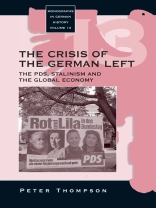Using Nietzsche’s categories of monumentalist, antiquarian and critical history, the author examines the historical and theoretical contexts of the collapse of the GDR in 1989 and looks at the positive and negative legacies of the GDR for the PDS (the successor party to the East German Communists). He contends that the Stalinization of the GDR itself was the product not just of the Cold War but of a longer inter-systemic struggle between the competing primacies of politics and economics and that the end of the GDR has to be seen as a consequence of the global collapse of the social imperative under the pressure of the re-emergence of the market-state since the mid-1970s. The PDS is therefore stuck in dilemma in which any attempt to ’arrive in the Federal Republic’ (Brie) is criticized as a readiness to accept the dominance of the market over society whereas any attempt to prioritize social imperatives over the market is attacked as a form of unreconstructed Stalinism. The book offers some suggestions as to how to escape from this dilemma by returning to the critical rather than monumentalist and antiquarian traditions of the workers’ movement.
Innehållsförteckning
Preface and Acknowledgements
List of Abbreviations
Introduction
Chapter 1. On the Uses and Disadvantages of History for the PDS
- Monumentalism
- Antiquarianism
- Critical History
Chapter 2. The Long Cold War and the Short Political Century
- The Primacy of Politics and the Long Cold War
- The Primacy of Economics
Chapter 3. The PDS: Marx’s Baby or Stalin’s Bathwater?
- Monumentalism and Antiquarianism in the PDS
- Critical History and the Future of the PDS
Conclusions
Bibliography
Index
Om författaren
Peter Thompson is a lecturer in German at the University of Sheffield, UK. His research since 1990 has concentrated mainly on the history of the German workers’ movement, the transformation of the GDR and the PDS but he has also written on ecology, the history of ideas and Bertolt Brecht.












